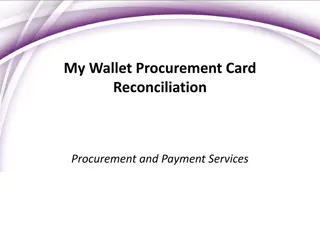
Best Crypto Wallet - cryptorecoverysystem.com
We'll explore the best crypto wallet available on the market, considering various factors such as security features, supported.nEmail: support@cryptorecoverysystem.comnnWhtsApp: 31610579708
Download Presentation

Please find below an Image/Link to download the presentation.
The content on the website is provided AS IS for your information and personal use only. It may not be sold, licensed, or shared on other websites without obtaining consent from the author. If you encounter any issues during the download, it is possible that the publisher has removed the file from their server.
You are allowed to download the files provided on this website for personal or commercial use, subject to the condition that they are used lawfully. All files are the property of their respective owners.
The content on the website is provided AS IS for your information and personal use only. It may not be sold, licensed, or shared on other websites without obtaining consent from the author.
E N D
Presentation Transcript
Best Crypto Wallet - cryptorecoverysystem.com https://www.cryptorecoverysystem.com/be st-crypto-wallet/ In the world of cryptocurrency, a crypto wallet is an essential tool for storing, managing, and transacting digital assets securely. With the growing popularity of cryptocurrencies like Bitcoin, Ethereum, and Litecoin, the demand for reliable and secure crypto wallets has surged. In this article, we ll explore the best crypto wallets available on the market, considering various factors such as security features, supported cryptocurrencies, user experience, and more.
Introduction To Crypto Wallets A crypto wallet is a software program or a hardware device that stores the private keys required to access and manage a user s cryptocurrency holdings. These wallets come in various forms, including hardware wallets, software wallets, web wallets, and paper wallets. Choosing the right type of wallet is crucial to ensuring the security and accessibility of your digital assets. Types Of Crypto Wallets Hardware Wallets Hardware wallets are physical devices that store the user s private keys offline, providing an extra layer of security against online threats such as hacking and malware. Popular hardware wallets include Ledger Nano S, Trezor, and KeepKey. Software Wallets Software wallets are applications or programs that run on desktop or mobile devices, allowing users to store and manage their cryptocurrencies. Examples of software wallets include Exodus, Atomic Wallet, and Electrum. Web Wallets Web wallets are online platforms or services that store users private keys on remote servers. While convenient for accessing funds from any internet-connected device, web wallets are considered less secure than hardware or software wallets due to the risk of hacking and phishing attacks. Coinbase, Blockchain.com, and MyEtherWallet are some examples of web wallets. Paper Wallets Paper wallets are physical documents that contain a printed copy of the user s private keys and public addresses. While paper wallets offer a high level of security as they are not susceptible to online attacks, they require careful handling to prevent loss or damage. Factors To Consider When Choosing A Crypto Wallet When selecting a crypto wallet, it s essential to consider several factors to ensure the safety and convenience of your digital assets. Security Features
Look for wallets that offer robust security features such as two-factor authentication (2FA), biometric authentication, and multisignature support to protect your funds against unauthorized access. Supported Cryptocurrencies Check whether the wallet supports the cryptocurrencies you intend to store or trade. Some wallets are designed to support a wide range of digital assets, while others may only support a select few. User Interface And Experience Choose a wallet with an intuitive user interface and user-friendly features to make managing your cryptocurrencies easy and hassle-free, especially if you re new to the world of crypto. Backup And Recovery Options Ensure that the wallet provides reliable backup and recovery options, such as mnemonic phrases or seed keys, to help you regain access to your funds in case of loss or theft. Cost Consider the cost of using the wallet, including any fees for transactions, account maintenance, or additional features. While some wallets are free to use, others may charge fees for certain services. Top 5 Best Crypto Wallets Wallet A Features: Security: Supported Cryptocurrencies: User Interface: Cost: Wallet B Features: Security: Supported Cryptocurrencies: User Interface:
Cost: Wallet C Features: Security: Supported Cryptocurrencies: User Interface: Cost: Wallet D Features: Security: Supported Cryptocurrencies: User Interface: Cost: Wallet E Features: Security: Supported Cryptocurrencies: User Interface: Cost: How To Set Up And Use A Crypto Wallet Setting up and using a crypto wallet is a straightforward process, but it s essential to follow the instructions carefully to ensure the security of your funds. Here s a step-by- step guide for beginners: 1. Choose a wallet: Select a wallet that meets your security and usability needs. 2. Download or purchase the wallet: Download the software or purchase the hardware device from a reputable source. 3. Set up the wallet: Follow the instructions provided by the wallet provider to create a new wallet and generate your private keys. 4. Back up your wallet: Write down your mnemonic phrase or seed keys and store them in a safe place. 5. Fund your wallet: Transfer your desired amount of cryptocurrencies to your wallet s public address.
6. Manage your funds: Use the wallets interface to send, receive, and manage your digital assets securely. Conclusion In conclusion, choosing the best crypto wallet is essential for safeguarding your digital assets against theft, loss, or unauthorized access. By considering factors such as security features, supported cryptocurrencies, user experience, and cost, you can select a wallet that meets your specific needs. Remember to follow best practices for wallet security and backup to ensure the safety of your funds in the ever-evolving world of cryptocurrency. FAQs (Frequently Asked Questions) 1.Are Hardware Wallets Safer Than Software Wallets? Hardware wallets are generally considered safer than software wallets due to their offline storage of private keys, which protects against online threats like hacking and malware. 2.Can I Use The Same Wallet For Multiple Cryptocurrencies? It depends on the wallet. Some wallets support a wide range of cryptocurrencies, while others may only support a select few. Make sure to choose a wallet that supports the cryptocurrencies you intend to store or trade. 3.What Should I Do If I Lose Access To My Crypto Wallet? If you lose access to your crypto wallet, you can typically recover it using the backup or recovery options provided by the wallet provider, such as mnemonic phrases or seed keys. Make sure to keep these backup options safe and accessible. 4.Are There Any Fees Associated With Using Cryptographic Wallets? Yes, some wallets may charge fees for transactions, account maintenance, or additional features. Make sure to check the fee structure of the wallet before using it. 5.How Can I Ensure The Security Of My Crypto Wallet? To ensure the security of your crypto wallet, use strong passwords, enable two- factor authentication (2FA), and keep your backup options (such as mnemonic phrases or seed keys) safe and secure. Additionally, avoid sharing your private keys or sensitive information with anyone.






















